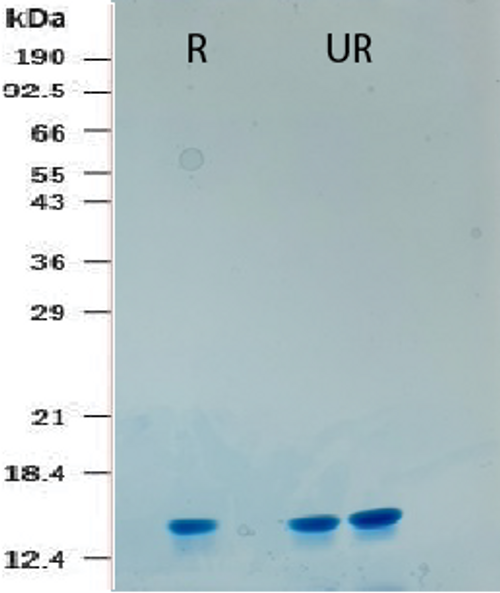IL-21, a versatile cytokine, originates from CD4+ T cells upon encountering antigens. Its primary role involves enhancing the immune system's antigen-specific responses. IL-21 influences various immune cell activities: it fosters the transformation of T cell-activated B cells into plasma and memory B cells, boosts IgG production in tandem with IL-4, and prompts apoptosis in naive and stimulated B cells without T cell input. Furthermore, IL-21 bolsters the anti-tumor functions of CD8+ T cells and natural killer (NK) cells.
To execute its functions, IL-21 binds to the IL-21R, a type I cytokine receptor that includes the γ chain (γc) shared with other cytokine receptors like IL-2, IL-4, IL-7, IL-9, and IL-15. This interaction sets off a chain reaction involving JAK1 and JAK3 tyrosine kinases' activation, ultimately leading to STAT1 and STAT3 transcription factor activation.
The recombinant Human IL-21, a 15.4 kDa protein composed of 132 amino acids, mirrors these biological activities.
|
Product Specifications
|
|
| Species | Human |
| Published species |
Human, Mouse
|
| Expression System | E. coli |
| Amino acid sequence |
MQDRHMIRMR QLIDIVDQLK NYVNDLVPEF LPAPEDVETN CEWSAFSCFQ KAQLKSANTG NNERIINVSI KKLKRKPPST NAGRRQKHRL TCPSCDSYEK KPPKEFLERF KSLLQKMIHQ HLSSRTHGSE DS
|
| Molecular weight | 15.4 kDa |
| Class | Recombinant |
| Type | Protein |
| Purity |
≥ 98% by SDS-PAGE gel and HPLC analyses.
|
| Endotoxin concentration | <0.1 EU/µg |
| Activity |
Determined by its ability to stimulate the proliferation of human ANBL-6 cells. The expected ED50 is ≤ 0.5 ng/ml, corresponding to a specific activity of ≥ 2 x10^6 units/mg.
|
| Conjugate | Unconjugated |
| Form | Lyophilized |
| Contains |
no preservative
|
| Storage conditions | -20°C |
CAUTION
For Research Use Only. Not for use in diagnostic procedures.














